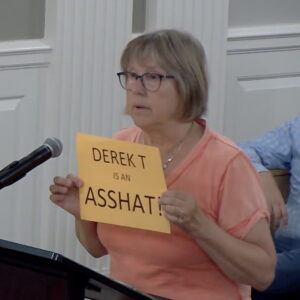NHJournal's Damien Fisher shows that some Nashua (NH) pols seem to lack LFOD understanding: Free Speech Advocates Push Back on Nashua Display Ban. I've swiped the photo illustration from his article, at your right. The caption is…
Nashua resident Laurie Ortolano's public comment time was cut short Monday night after she displayed a homemade sign apperantly [sic] calling a member of the city Board of Aldermen an Asshat.
"Apparently". Misspelling aside, I think Damien could have safely omitted that word.
But Derek T (Thibeault) is not the sole asshat among the aldermen:
Alderman Rick Dowd is leading the push for an ordinance that would prohibit any display items in the chambers during public meetings.
“There’s no need for debate. This ordinance is going to make it a rule we can enforce,” Dowd said Monday night during a meeting of the Personnel/Administrative Affairs Committee.
According to Dowd, the signs, banners, and flags displayed at public meetings have gotten out of hand. He claims some attendees are blocking cameras and obstructing others’ views with large signs, and that the displays could potentially block emergency exits. While Nashua previously operated under an unwritten “gentlemen’s agreement” against such displays, Dowd said too many members of the public now ignore that tradition and bring their signs anyway.
Damien quotes from a letter sent to Nashua's Personnel and Administrative Affairs Committee from the New England First Amendment Coalition, which you can read here; it also includes the text of the proposed, clearly unconstitutional, ordinance.
Laurie Ortolano, by the way, is an occasional contributor to Granite Grok, and her author page is here.
Also of note:
-
Of course, balls don't "drop" in space. But Alexander William Salter uses that metaphor anyway: Trump’s first-term space policy was great, but the White House is dropping the ball.
The first Trump administration was the best for space policy in decades. From the creation of the Space Force to pathbreaking international agreements such as the Artemis Accords to stronger protections for outer space property rights, America reasserted itself as the world’s premier space power. None of this would have been possible without a team of space policy experts and political leaders in key roles.
But this time is different. Many important space policy and leadership positions remain vacant. Qualified personnel have been nominated, but the Senate has yet to act. Nor has President Trump chosen to force the issue.
Reading between the lines, apparently at least some of the ball-dropping is fallout from the Trump-Musk split. Sad!
One obvious problem is the continuing existence of Artemis/SLS.
-
"Hey, BLS! Working hard, or hardly working?" Dominic Pino has an explainer about job-counting: Why Counting Jobs Is Really, Really Hard.
On its face, it sounds like the Bureau of Labor Statistics has an easy task: Just count the jobs. A lot of people have jobs, some people don’t, they’re all out there, just count them up.
Of course, it can’t literally go and count every person each month, so it uses statistical methods to survey employees and employers. But people have been doing surveys forever. Just send them out and run it through a computer and write the report. Easy.
No. Not at all. Not even close.
Click over for the gory details. But I found this detail telling:
The original estimate for the number of jobs in the month of June was 159,724,000. Then, after the revision with better data, it was 159,466,000. That’s a 0.161 percent correction, based on higher-quality information that didn’t exist at the time of the original estimate.
Don't worry, once Trump gets his new BLS commissioner, the numbers will be perfectly accurate, and will come festooned with rainbows, unicorns, and Hello Kitty stickers.
-
Or not. Assuming the Trumpification of future BLS press releases, what to use instead? Jeff Maurer sketches out Five Economic Metrics to Track Now That BLS Data is Compromised. Let's go with… yeah, this one:
3. Time spent behind unbelievably old ladies searching for exact change in small, floral change purses
In a normal week, a typical American spends 4-6 hours in line behind feeble nonagenarians rummaging through tiny, flower-covered change purses as they attempt to pay for miniscule transactions with exact change. Economists sometimes count the number of people lined up behind these antediluvian crones and multiply that by the number of times in an hour that they hear someone mutter “Come the fuck on, Betty White” to compile a number they call “the granny grocery store metric”.
When times are tough, Americans can spend 10, 12, even 15 hours a week as dust-covered biddies who look like they probably remember the Hapsburg Empire search for the precise amount of money to buy a book of matches, or a single Tic-Tac. This happens because senior citizens worry that they might not be able to make ends meet if they don’t bring an entire fucking Albertsons to a stand-still while they rummage for a ha’penny that Grover Cleveland tossed from a carriage in 1885. When the economy is hot, these four-foot-tall Wives Of Yoda might produce paper money, or even a bank card that they have no clue how to use. But there’s a well-proven inverse relationship between the time that World War I surplus grannies spend literally blocking commerce and overall economic health.
God bless the old folks, but yeah: when you see the van from the local assisted living facility pulled up outside the supermarket, you might want to hit the self-checkout scanners.

![[The Blogger]](/ps/images/barred.jpg)



